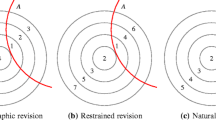Abstract
This paper presents eight (previously unpublished) adaptive logics for belief revision, each of which define a belief revision operation in the sense of the AGM framework. All these revision operations are shown to satisfy the six basic AGM postulates for belief revision, and Parikh’s axiom of Relevance. Using one of these logics as an example, we show how their proof theory gives a more dynamic flavor to belief revision than existing approaches. It is argued that this turns belief revision (that obeys Relevance) into a more natural undertaking, where analytic steps are performed only as soon as they turn out to be necessary in order to uphold certain beliefs.
Similar content being viewed by others
References
Alchourrón C. E., Gärdenfors P., Makinson D. (1985) On the logic of theory change: Partial meet contraction and revision functions. Journal of Symbolic Logic 50: 510–530
Batens D. (1999) Inconsistency-adaptive logics. In: Orłowska E. (ed) Logic at work. Essays dedicated to the memory of Helena Rasiowa. Physica Verlag (Springer), Heidelberg, pp 445–472
Batens, D. (2001). A general characterization of adaptive logics. Logique et Analyse, 173–175, 45–68. Appeared 2003.
Batens D. (2005) A procedural criterion for final derivability in inconsistency-adaptive logics. Journal of Applied Logic 3: 221–250
Batens D. (2007) A universal logic approach to adaptive logics. Logica Universalis 1: 221–242
Batens D., Clercq K., Verdée P., Meheus J. (2009) Yes fellows, most human reasoning is complex. Synthese 166: 113–131
Batens D., Meheus J., Provijn D., Verhoeven L. (2003) Some adaptive logics for diagnosis. Logic and Logical Philosophy 11/12: 39–65
Batens D., Straßer C., Verdée P. (2009) On the transparency of defeasible logics: Equivalent premise sets, equivalence of their extensions, and maximality of the lower limit. Logique et Analyse 207: 281–304
Bienvenu, M., Herzig, A., & Qi, G. (2008). Prime implicate-based belief revision operators. In Proceedings of the 2008 conference on ECAI 2008: 18th European Conference on Artificial Intelligence (pp. 741–742). Amsterdam: IOS Press.
Chopra S., Parikh R. (2000) Relevance sensitive belief structures. Annals of Mathematics and Artificial Intelligence 28: 259–285
Gärdenfors P. (1978) Conditionals and changes of belief. Acta Philosophica Fennica 30: 381–404
Gärdenfors P. (1982) Rules for rational changes of belief. Philosophical Studies 34: 88–101
Hansson S. O. (1999) A textbook of belief dynamics. Theory change and database updating. Kluwer, Dordrecht
Hansson, S. O. (2006). The logic of belief revision. http://plato.stanford.edu/entries/logic-belief-revision.
Horsten L. (2007) Welch Philip the undecidability of propositional adaptive logic. Synthese 158: 41–60
Jackson, P. (1992). Computing prime implicates. In Proceedings of the 1992 ACM annual conference on Communications. CSC ’92 (pp. 65–72). New York: ACM.
Kourousias G., Makinson D. (2006) Respecting relevance in belief change. Análisis Filosófico 26: 53–61
Kourousias G., Makinson D. (2007) Parallel interpolation, splitting, and relevance in belief change. The Journal of Symbolic Logic 72: 994–1002
Makinson D. (2009) Propositional relevance through letter-sharing. Journal of Applied Logic 7: 377–387
Parikh R. (1999) Beliefs, belief revision, and splitting languages. Logic, Language, and Computation 2: 266–278
Perrussel, L., Marchi, J., & Zhang, D. (2011). Characterizing relevant belief revision operators. In AI 2010: Advances in Artificial Intelligence. Lecture Notes in Computer Science (Vol. 6464, pp. 42–51). Heidelberg: Springer.
Pollock J. (1987) Defeasible reasoning. Cognitive Science 11(4): 481–518
Shoham Y. (1987) A semantical approach to nonmonotonic logics. In: Ginsberg M. L. (ed) Readings in non-monotonic reasoning. Morgan Kaufmann, Los Altos, CA, pp 227–249
Stolpe, A. (2010). Relevance, derogation and permission: A case for a normal form for a code of norms. In Lecture Notes in Artificial Intelligence (Lecture Notes in Computer Science) (Vol. 6181, pp. 98–115). Heidelberg: Springer.
Van De Putte F. (2011a) Hierarchic adaptive logics. Logic Journal of IGPL 20(1): 45–72
Van De Putte, F. (2011b). Prime implicates and relevant belief revision. Journal of Logic and Computation, in press. http://logcom.oxfordjournals.org/content/early/2011/11/07/logcom.exr040.full.pdf.
Verdée P. (2009) Adaptive logics using the minimal abnormality strategy are \({\Pi^1_1}\) -complex. Synthese 167: 93–104
Verdée, P. (2012). A proof procedure for adaptive logics. Logic Journal of the IGPL, in press. http://logica.ugent.be/centrum/preprints/verdee.pdf.
Verhoeven L. (2001) All premisses are equal, but some are more equal than others. Logique et Analyse 173–174–175: 165–188
Verhoeven L. (2003) Proof theories for some prioritized consequence relations. Logique et Analyse 183–184: 325–344
Wu M., Zhang M. (2010) Algorithms and application in decision-making for the finest splitting of a set of formulae. Knowledge-Based Systems 23: 70–76
Wu, M., Zhu, Z., Zhang, M. (2008). Partial meet contraction based on relevance criterion. In Proceedings of the International MultiConference of Engineers and Computer Scientists, Hong Kong.
Author information
Authors and Affiliations
Corresponding author
Rights and permissions
About this article
Cite this article
Van De Putte, F., Verdée, P. The dynamics of relevance: adaptive belief revision. Synthese 187 (Suppl 1), 1–42 (2012). https://doi.org/10.1007/s11229-012-0116-9
Received:
Accepted:
Published:
Issue Date:
DOI: https://doi.org/10.1007/s11229-012-0116-9




